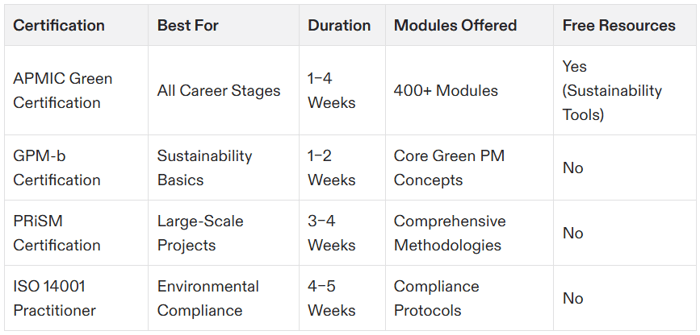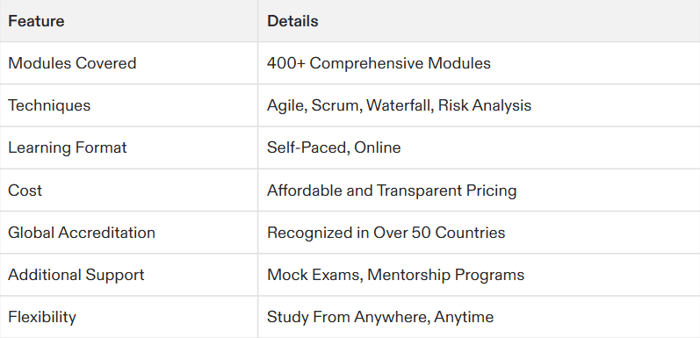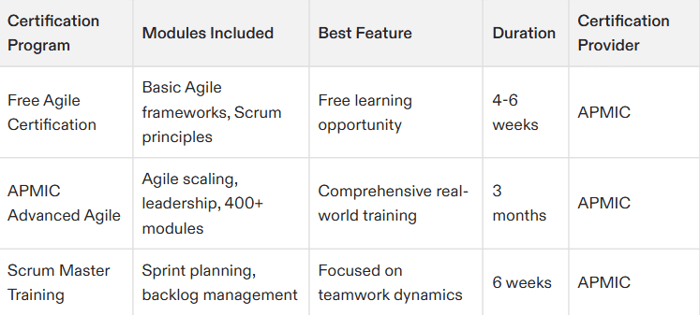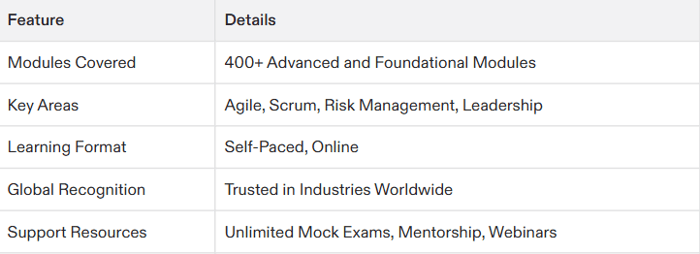Table of Contents
- Introduction
- What Is Green Project Management Certification?
- Why Pursue a Green Project Management Certification
- How to Get Started with Green Project Management Certification
- The Top Certifications in Green Project Management
- FAQs About Green Project Management Certification
- Informative Certification Comparison Table
- Final Thoughts
Introduction
With the growing call for environmental responsibility, businesses worldwide are striving to incorporate sustainability into their operations. At the heart of this shift lies green project management—ensuring that projects are planned, executed, and closed with minimal environmental impact.
If you want to play a proactive role in this transformation, earning a green project management certification will set you apart as a leader in sustainable practices.
Throughout this guide, we’ll explore what green project management certification entails, why it’s an essential credential for modern professionals, and how to choose the best program to boost your career while championing environmental stewardship.
What Is Green Project Management Certification?
A green project management certification equips professionals with the skills to integrate sustainability principles into the project lifecycle.
Here’s what it entails in practice:
- Prioritizing Sustainability: Managing resources, timelines, and costs while minimizing environmental impacts.
- Holistic Thinking: Balancing business outcomes with ecological and societal benefits.
- Compliance with Standards: Meeting global green guidelines such as ISO 14001.
When you earn a green project management certification, you don’t just improve your career prospects—you become part of a global movement driving positive, sustainable change.
Why Pursue a Green Project Management Certification
Sustainable practices have become an essential part of modern business strategies. Tackling climate change, enhancing resource efficiency, and adapting to shifting consumer demands are reshaping industries across the globe. Here’s why sustainability-focused project management credentials can make a significant difference in your career:
Position Yourself as a Leader in Sustainability
Certified professionals specializing in green-focused project management are in high demand as businesses prioritize eco-friendly initiatives, providing you with a valuable edge.Make a Difference Beyond Your Career
It’s about more than professional advancement. By managing sustainable projects, you contribute to a healthier planet and leave a positive legacy.Tap Into a Growing Job Market
The surge in green-focused roles means more opportunities in areas like renewable energy, sustainable construction, and eco-friendly product innovation.Increase Your Earning Potential
Specialized certifications often lead to higher salaries because of the unique expertise they add to your skillset.Shape a Better Future for the Next Generation
By leading sustainable initiatives, you don’t just drive positive environmental change—you also inspire others to adopt and champion eco-conscious practices.
Key Features of a High-Quality Green Project Management Certification
When choosing a green project management certification, it’s vital to ensure that the program meets the highest standards. Here's an in-depth look at the features you should prioritize:
1. Alignment with Global Standards
The credibility and value of a certification largely depend on whether it adheres to globally recognized standards. Frameworks like PRiSM™ (Projects Integrating Sustainable Methods) and ISO 14001 for environmental management ensure certifications are in line with the best practices for sustainability. These standards emphasize not just the theoretical understanding of sustainability but also practical implementation strategies that align with international regulations. A certification built around these frameworks assures employers and industry leaders of your expertise and ensures that you are equipped to lead projects with lasting environmental impact.
2. Comprehensive Curriculum
A robust green project management certification should offer a curriculum that goes beyond the basics. Courses should dive deep into critical topics like energy-efficient solutions, which teach you how to reduce energy consumption in operations, and waste reduction strategies, which promote innovative ways to cut down on waste throughout a project’s lifecycle. Additionally, sustainable resource management is a must, as it prepares professionals to carefully balance environmental impact with resource allocation. This comprehensive knowledge is vital for addressing real-world challenges, from reducing carbon footprints in project execution to implementing greener supply chain practices.
3. Multi-Industry Relevance
One of the most powerful aspects of a high-quality certification is its ability to apply across various fields. Industries such as construction, where eco-friendly building practices are in demand, IT, which focuses on reducing data center energy use, and product development, where sustainable materials are critical, all benefit from green project management expertise. A certification program that provides this multi-industry versatility equips professionals to pivot across sectors seamlessly. This flexibility not only enhances career opportunities but also ensures that sustainability practices are implemented in diverse areas, fostering a broader environmental impact.
4. Real-World Applications
Many certifications focus solely on theory, but the best programs emphasize practical learning. By including case studies and hands-on assignments, these programs allow participants to see how green project management concepts translate into action. For example, analyzing a case study on waste management in urban infrastructure teaches you how these practices unfold in a real setting. Similarly, hands-on work, like designing a sustainable supply chain for a mock project, gives learners the confidence and skills to apply their knowledge directly in their careers. This combination of theory and practice ensures you'll be ready to manage sustainability-focused projects from day one.
5. Flexibility for Working Professionals
Time is a limited resource, especially for working professionals. A certification program like APMIC’s Green Project Management Certification offers the flexibility needed to balance learning with a demanding career. With part-time and self-paced options, working professionals can adapt their schedules without compromising on the depth and quality of their education. Furthermore, such programs often integrate interactive tools and resources, such as online forums and video tutorials, ensuring a seamless learning experience. This accessibility enables professionals to gain a strong understanding of sustainability principles while continuing to excel in their current roles.
Programs like APMIC’s Green Project Management Certification allow you to adapt learning to your schedule while gaining deep insights into sustainability.
How to Get Started with Green Project Management Certification
Define Your Career Path
Determine how you want to apply your knowledge of green project management—whether in construction, IT, or renewable energy.Explore Certification Options
Evaluate programs based on industry reputation, content relevance, and delivery format. Certifications like APMIC lead the market for offering over 400 modules tailored to varied career stages.Enroll in a Sustainable Program
Focus on institutions that emphasize eco-friendly practices in their training methodologies.Prepare Strategically
Equip yourself with resources such as webinars, white papers, and sustainability audits to enhance learning.Ace Your Certification Exam
Test your understanding of methodologies, environmental standards, and green project principles to succeed as a credentialed professional.
The Top Certifications in Green Project Management
1. GPM-b (Green Project Manager – Basic)
This entry-level certification by GPM Global focuses on applying sustainability principles throughout the project lifecycle.
- Best For: Beginners in green projects.
- Duration: 1–2 weeks of preparation.
2. APMIC Green Project Management Certification
The APMIC certification offers unmatched flexibility and depth with over 400 tailored modules.
- Best For: Beginners to senior project managers.
- Focus Areas: Ecological sustainability, risk assessment, and digital tools for green projects.
- Duration: 1–4 weeks (self-paced).
- Why APMIC Stands Out: It combines theoretical learning with free resources like sustainability audits.
- Find Out More:APMIC Green Project Management Program.
3. PRiSM Green Certification
Specifically designed for those implementing sustainable practices in large-scale development projects.
- Best For: Professionals in large-scale industries like construction or manufacturing.
- Duration: Around 3 weeks.
FAQs About Green Project Management Certification
1. What does a green project manager do?
A green project manager ensures that projects adhere to sustainability principles throughout their lifecycle, focusing on resource efficiency and environmental impact.
2. Who should pursue this certification?
Professionals in project management, engineering, construction, IT, or any field that involves long-term resource planning should pursue it.
3. How quickly can I earn the certification?
Programs like APMIC’s can be completed in as little as 1–4 weeks, depending on your pace.
4. Can I study online?
Yes! Most green certifications, including those by APMIC, are available online, ensuring global accessibility.
5. Why is the APMIC certification ideal for sustainability practices?
With a mix of customizable modules, industry-focused content, and free practical tools, APMIC offers a program tailored for impactful sustainability leadership.
Informative Certification Comparison Table
Final Thoughts
The world is shifting towards sustainability, and green project management is at the core of this transformation. By obtaining a green project management certification, you not only future-proof your career but also contribute to building a more sustainable world.
Programs like the APMIC certification offer unparalleled flexibility and depth, making it easier for you to master green project strategies while balancing your professional responsibilities.
Take the first step today by enrolling in APMIC’s Green Project Management Certification. Equip yourself with the tools and knowledge needed to lead projects that leave a lasting, positive impact on the planet!






